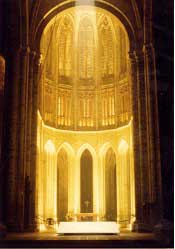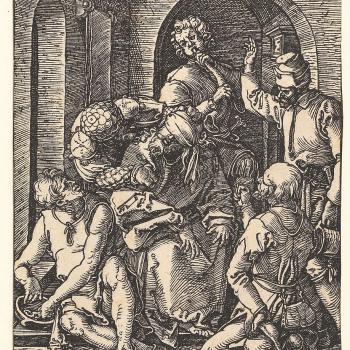By Elizabeth Pinborough
 I strongly believe in sharing faith journeys. Listening forces us to confront the prismatic nature of another person's spiritual experience and accept that perhaps a multiplicity of paths lead to the same truth or to a different truth entirely. We become less judgmental of others as we learn the ways in which God has worked in their lives, sometimes inexplicably, but usually in ways that are similar to our own.
I strongly believe in sharing faith journeys. Listening forces us to confront the prismatic nature of another person's spiritual experience and accept that perhaps a multiplicity of paths lead to the same truth or to a different truth entirely. We become less judgmental of others as we learn the ways in which God has worked in their lives, sometimes inexplicably, but usually in ways that are similar to our own.
At Yale Divinity School, one can expect to be surrounded by a group of accomplished students who care deeply about faith and their individual denominations. The number of Mormons at the divinity school is roughly proportional to the number of Mormons in the wider U.S. population, which is not bad. But, that still means LDS are a minority, not to mention that they are theologically anomalous among other Christian faiths.
One needs to be able to talk about religion in terms other than the ones that most Mormons are used to talking. Devotional language, or a language of faith, is acceptable for the mainstream Christian denominations, but not many of these people understand the devotional language of Mormonism and are suspicious of Mormonism because of certain theological claims we make. You must be multilingual.
Is it challenging? Certainly.Faith and testimony are always in a state of flux, even if we maintain them with a degree of certainty. YDS was challenging to my testimony, although I perhaps might not have used that language to describe my beliefs until this year (it sounds odd, I know). That is in part because I grew up a skeptical believer, naturally questioning things and being open to a multiplicity of truths. I had read the Book of Mormon and felt that it was a good book. But what gave me a testimony of the book was the ways in which my life changed after reading it. The Spirit did not say to me, this is a true book. I felt the proof (or truth) was in the pudding (my life), and I did not dedicate myself to gaining more of a witness than that. What I forgot in this formulation of my spirituality and faith, was that spiritual nourishment does not last and must be a continual practice.
YDS did challenge my testimony of certain Mormon beliefs, such as the Restoration of the gospel and the Book of Mormon, although I have already pointed out that at least my testimony of the Book of Mormon was not extremely strong at the moment that I entered YDS. What I found most challenged was my belief in God. I took a systematic theology course both semesters, in which I learned other theories of God. Because I was in a mode of questioning and really figuring out whether I did believe the claims of Mormonism, I was really shaken.
The curriculum might not have the same effect on a different person. This is simply what happened to me. I began to doubt that God was the God I had worshiped for my entire life. Because I felt like I no longer knew who God was, I felt like I could not exercise my faith in the same way that I had before. I began to seriously doubt the efficacy of prayer. I was also taking Old Testament at the time, and I began to doubt the inspiration and coherence of the scriptures, any scripture. These and my naturally questioning temperament made the experience very hard. I think a different student, one who went in with a firmly established understanding of the limits of his or her own abilities to question and to find answers without the help of the Spirit would nonetheless have a similar but less dramatic experience.




